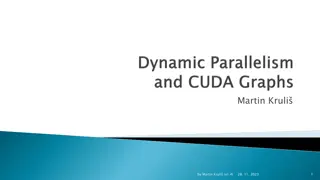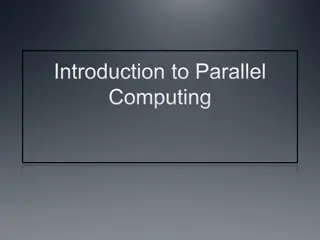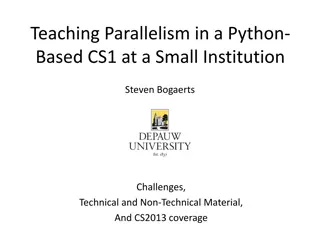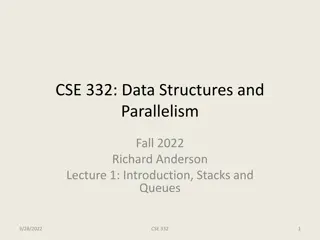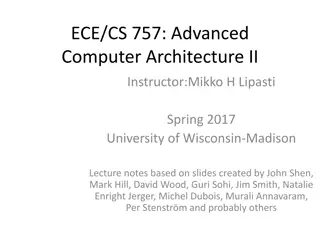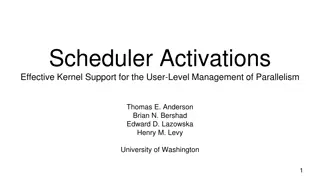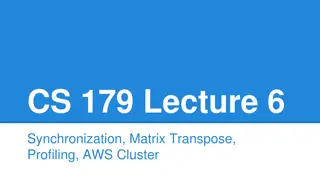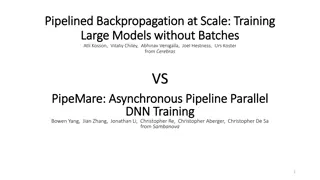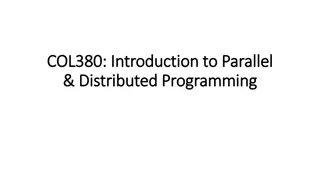
HPX: A C++ Library for Concurrency and Parallelism
HPX, a C++ standard library, provides a coherent and uniform API for programming parallel, distributed, and heterogeneous applications. It supports asynchronous code with millions of threads, seamless data parallelism, and task-based parallelism. HPX is widely portable across various platforms and well-integrated with C++ standard libraries, enabling high performance and scalability. Its programming model focuses on data dependencies, offering useful abstractions to simplify parallel and distributed processing. The library emphasizes the logical composition of data processing and provides a basis for different types of parallelism, such as iterative, fork-join, and data parallelism, while enabling runtime-based adaptivity.
Download Presentation

Please find below an Image/Link to download the presentation.
The content on the website is provided AS IS for your information and personal use only. It may not be sold, licensed, or shared on other websites without obtaining consent from the author. If you encounter any issues during the download, it is possible that the publisher has removed the file from their server.
You are allowed to download the files provided on this website for personal or commercial use, subject to the condition that they are used lawfully. All files are the property of their respective owners.
The content on the website is provided AS IS for your information and personal use only. It may not be sold, licensed, or shared on other websites without obtaining consent from the author.
E N D
Presentation Transcript
HPX The C++ Standards Library for Concurrency and Parallelism WEST Workshop, February 22nd, 2017 Hartmut Kaiser (hkaiser@cct.lsu.edu)
2/22/2017 HPX A General Purpose Runtime System The C++ Standards Library for Concurrency and Parallelism Exposes a coherent and uniform, C++ standards-conforming API for ease of programming parallel, distributed, and heterogeneous applications. Enables to write fully asynchronous code using hundreds of millions of threads. Provides unified syntax and semantics for local and remote operations. Enables seamless data parallelism orthogonally to task-based parallelism HPX - A C++ Standard Library for Concurrency and Parallelism, WEST Workshop 2017, Hartmut Kaiser HPX represents an innovative mixture of A global system-wide address space (AGAS - Active Global Address Space) Fine grain parallelism and lightweight synchronization Combined with implicit, work queue based, message driven computation Support for hardware accelerators 2
2/22/2017 HPX A C++ Standard Library Widely portable Platforms: x86/64, Xeon/Phi, ARM 32/64, Power, BlueGene/Q Operating systems: Linux, Windows, Android, OS/X HPX - A C++ Standard Library for Concurrency and Parallelism, WEST Workshop 2017, Hartmut Kaiser Well integrated with compiler s C++ Standard libraries Enables writing applications which out-perform and out-scale existing applications based on OpenMP/MPI http://stellar-group.org/libraries/hpx https://github.com/STEllAR-GROUP/hpx/ Is published under Boost license and has an open, active, and thriving developer community. Can be used as a platform for research and experimentation 3
2/22/2017 Programming Model Focus on the logical composition of data processing, rather than the physical orchestration of parallel computation Provide useful abstractions that shield programmer from low-level details of parallel and distributed processing HPX - A C++ Standard Library for Concurrency and Parallelism, WEST Workshop 2017, Hartmut Kaiser Centered around data dependencies not communication patterns Make data dependencies explicit to system thus allows for auto- magic parallelization Basis for various types of higher level parallelism, such as iterative, fork-join, continuation-style, asynchronous, data-parallelism Enable runtime-based adaptivity while applying application-defined policies 5
2/22/2017 Programming Model The consequent application of the Concept of Futures Make data dependencies explicit and visible to the runtime Implicit and explicit asynchrony Transparently hide communication and other latencies Makes over-subscription manageable Uniform API for local and remote operation Local operation: create new thread Remote operation: send parcel (active message), create thread on behalf of sender HPX - A C++ Standard Library for Concurrency and Parallelism, WEST Workshop 2017, Hartmut Kaiser Work-stealing scheduler Inherently multi-threaded environment Supports millions of concurrently active threads, minimal thread overhead Enables transparent load balancing of work across all execution resources inside a locality API is fully conforming with C++11/C++14 and ongoing standardization efforts 6
2/22/2017 HPX The API As close as possible to C++11/14/17 standard library, where appropriate, for instance std::thread hpx::thread std::mutex hpx::mutex std::future hpx::future (including N4538, Concurrency TS ) std::async hpx::async (including N3632) std::bind hpx::bind std::function hpx::function std::tuple hpx::tuple std::any hpx::any (N3508) std::cout hpx::cout std::for_each(par, ), etc. hpx::parallel::for_each (N4507, Parallelism TS , C++17) std::experimental::task_block hpx::parallel::task_block (N4411) HPX - A C++ Standard Library for Concurrency and Parallelism, WEST Workshop 2017, Hartmut Kaiser 7
2/22/2017 Control Model How is parallelism achieved? Explicit parallelism: Low-level: thread Middle-level: async(), dataflow(), future::then() Higher-level constructs Parallel algorithms (parallel::for_each and friends, fork-join parallelism for homogeneous tasks) Asynchronous algorithms (alleviates bad effect of fork/join) Task-block (fork-join parallelism of heterogeneous tasks) Asynchronous task-blocks Continuation-style parallelism based on composing futures (task-based parallelism) Data-parallelism on accelerator architectures (vector-ops, GPUs) Same code used for CPU and accelerators HPX - A C++ Standard Library for Concurrency and Parallelism, WEST Workshop 2017, Hartmut Kaiser 8
2/22/2017 Parallel Algorithms (C++17) HPX - A C++ Standard Library for Concurrency and Parallelism, WEST Workshop 2017, Hartmut Kaiser 9
2/22/2017 STREAM Benchmark std::vector<double> a, b, c; // data // ... init data HPX - A C++ Standard Library for Concurrency and Parallelism, WEST Workshop 2017, Hartmut Kaiser auto a_begin = a.begin(), a_end = a.end(), b_begin = b.begin() ...; // STREAM benchmark parallel::copy(par, a_begin, a_end, c_begin); // copy step: c = a parallel::transform(par, c_begin, c_end, b_begin, // scale step: b = k * c [](double val) { return 3.0 * val; }); parallel::transform(par, a_begin, a_end, b_begin, b_end, c_begin, // add two arrays: c = a + b [](double val1, double val2) { return val1 + val2; }); parallel::transform(par, b_begin, b_end, c_begin, c_end, a_begin, // triad step: a = b + k * c [](double val1, double val2) { return val1 + 3.0 * val2; }); 10
2/22/2017 Dot-product: Vectorization std::vector<float> data1 = {...}; std::vector<float> data2 = {...}; HPX - A C++ Standard Library for Concurrency and Parallelism, WEST Workshop 2017, Hartmut Kaiser double p = parallel::inner_product( datapar, std::begin(data1), std::end(data1), std::begin(data2), 0.0f, [](auto t1, auto t2) { return t1 + t2; }, // std::plus<>() [](auto t1, auto t2) { return t1 * t2; } // std::multiplies<>() ); // parallel and vectorized execution 11
2/22/2017 Control Model How is synchronization expressed? Low-level (thread-level) synchronization: mutex, condition_variable, etc. Replace (global) barriers with finer-grain synchronization (synchronize of a as-need- basis ) Wait only for immediately necessary dependencies, forward progress as much as possible Many APIs hand out a future representing the result Parallel and sequential composition of futures (future::then(), when_all(), etc.) Orchestration of parallelism through launching and synchronizing with asynchronous tasks Synchronization primitives: barrier, latch, semaphores, channel, etc. Synchronize using futures HPX - A C++ Standard Library for Concurrency and Parallelism, WEST Workshop 2017, Hartmut Kaiser 12
2/22/2017 Synchonization with Futures A future is an object representing a result which has not been calculated yet HPX - A C++ Standard Library for Concurrency and Parallelism, WEST Workshop 2017, Hartmut Kaiser Locality 1 Enables transparent synchronization with producer Future object Locality 2 Execute Future: Suspend consumer thread Hides notion of dealing with threads Makes asynchrony manageable Producer thread Execute another thread Allows for composition of several asynchronous operations Result is being returned Resume consumer thread (Turns concurrency into parallelism) 13
2/22/2017 Data Model AGAS essential underpinning for all data management Foundation for syntactic semantic equivalence of local and remote operations Full spectrum of C++ data structures are available Either as distributed data structures or for SPMD style computation HPX - A C++ Standard Library for Concurrency and Parallelism, WEST Workshop 2017, Hartmut Kaiser Explicit data partitioning, manually orchestrated boundary exchange Using existing synchronization primitives (for instance channels) Use of distributed data structures, like partitioned_vector Use of parallel algorithms Use of co-array like layer (FORTRAN users like that) Load balancing: migration Move objects around in between nodes without stopping the application 15
2/22/2017 HPX - A C++ Standard Library for Concurrency and Parallelism, WEST Workshop 2017, Hartmut Kaiser Small Example 16
2/22/2017 Extending Parallel Algorithms HPX - A C++ Standard Library for Concurrency and Parallelism, WEST Workshop 2017, Hartmut Kaiser Sean Parent: C++ Seasoning, Going Native 2013 17
2/22/2017 Extending Parallel Algorithms New algorithm: gather template <typename BiIter, typename Pred> pair<BiIter, BiIter> gather(BiIter f, BiIter l, BiIter p, Pred pred) { BiIter it1 = stable_partition(f, p, not1(pred)); BiIter it2 = stable_partition(p, l, pred); return make_pair(it1, it2); } HPX - A C++ Standard Library for Concurrency and Parallelism, WEST Workshop 2017, Hartmut Kaiser Sean Parent: C++ Seasoning, Going Native 2013 18
2/22/2017 Extending Parallel Algorithms New algorithm: gather_async template <typename BiIter, typename Pred> future<pair<BiIter, BiIter>> gather_async(BiIter f, BiIter l, BiIter p, Pred pred) { future<BiIter> f1 = parallel::stable_partition(par(task), f, p, not1(pred)); future<BiIter> f2 = parallel::stable_partition(par(task), p, l, pred); return dataflow( unwrapped([](BiIter r1, BiIter r2) { return make_pair(r1, r2); }), f1, f2); } HPX - A C++ Standard Library for Concurrency and Parallelism, WEST Workshop 2017, Hartmut Kaiser 19
2/22/2017 Extending Parallel Algorithms (await) New algorithm: gather_async template <typename BiIter, typename Pred> future<pair<BiIter, BiIter>> gather_async(BiIter f, BiIter l, BiIter p, Pred pred) { future<BiIter> f1 = parallel::stable_partition(par(task), f, p, not1(pred)); future<BiIter> f2 = parallel::stable_partition(par(task), p, l, pred); return make_pair(co_await f1, co_await f2); } HPX - A C++ Standard Library for Concurrency and Parallelism, WEST Workshop 2017, Hartmut Kaiser 20
2/22/2017 HPX - A C++ Standard Library for Concurrency and Parallelism, WEST Workshop 2017, Hartmut Kaiser 21

